B Tech in Computer Science Engineering (CSE)
2025-09-25 8:42B Tech in Computer Science Engineering (CSE)
B Tech in Computer Science Engineering (CSE)
B. Tech in Computer Science Engineering (CSE) Course Details.
Overview of Computer Science Engineering
B.Tech in Computer Science Engineering (CSE) is a multidisciplinary undergraduate program that integrates computer science fundamentals with core engineering principles. It focuses on the design, development, and application of both software and hardware systems. The curriculum covers a wide range of domains, including artificial intelligence and data science. Students pursuing a B.Tech in CSE gain practical and theoretical skills to solve complex problems, build innovative technologies, and drive digital transformation across industries. With the growing global demand for skilled tech professionals, a B.Tech in CSE opens up diverse career opportunities and provides a strong foundation for further specialization or research.
CSE Course Details
Key Components of CSE Courses:
Degree Offered
Common degrees include Bachelor of Technology (B.Tech)..
Specializations
Students can choose from a variety of specializations such as:
- Artificial Intelligence and Machine learning
- Data Science
Mode of Study
CSE courses is available in only Full time.
Eligibility Criteria:
Educational Qualifications:
- Candidates must have completed their 10+2 education with Physics, Chemistry, and Mathematics.
- or 3 Years Polytechnic in any engineering stream.
- Direct Admission also available through management quota In Alpine Group of Institutions.
Tips for Admission Success
- Documentation: Ensure all documents are ready and meet the institution’s requirements.
- Interviews: Be prepared for possible interviews or group discussions.
CSE Course Duration
The duration of CSE courses depends on the level of the program:
- Bachelor’s Degree (B.Tech/B.Sc): 4 years
CSE Course Eligibility
Eligibility criteria for CSE courses vary based on the degree level.
Bachelor’s Degree (B.Tech/B.Sc)
Criteria | Details |
Educational Qualification | Completion of 10+2 with Mathematics, Physics, and Chemistry |
Minimum Percentage | Typically 50% in 10+2 |
CSE Career Opportunities
Graduates with a degree in Computer Science Engineering have access to a wide range of career paths. Here are some of the most popular roles:
Job Title | Description |
Machine Learning Engineer | Design ML models and pipelines . |
Data Scientist | Analyze complex data sets to drive business decisions. |
Computer Vision Engineer | Specializes in images & video analysis. |
AI Research Scientist | Works on advancing ML theory and models. |
NLP Engineer | Works with language models. |
AI Engineer | Develop AI models and machine learning algorithms. |
Data Engineer | Prepare large-scale data pipelines |
Industry Demand
The tech industry is continuously evolving, leading to high demand for CSE graduates in various sectors, including finance, healthcare, telecommunications, and e-commerce.
CSE Salary Expectations
Salaries for CSE graduates can vary based on several factors, including job role, experience, and geographic location. Below are average salary ranges for common roles in India only:
Job Title | Salary Range (INR) |
Machine Learning Engineer | ₹10 L- ₹90L |
Data Scientist | ₹10 L – ₹50 L |
AI Research Scientist | ₹10 L – ₹50 L |
Computer Vision Engineer | ₹8 L – ₹40 L |
NLP Engineer | ₹10 L – ₹40 L |
Data Engineer | ₹10 L- ₹50 L |
Robotics Engineer / AI Focused | ₹10 L – ₹50 Lakh |
Factors Influencing Salary
Experience Level:
Entry-level positions typically have lower salaries than senior roles.
Location:
Salaries can differ significantly based on the cost of living in different regions.
Company Type:
Startups may offer different compensation packages compared to established firms.
Some of the Popular Career Paths Include

Life of a
BTech CSE Student
The life of a B.Tech in Computer Science Engineering (CSE) student at Alpine Group of Institutes is dynamic and enriching, blending academics, innovation, and campus culture. Students delve into cutting-edge technologies like AI, machine learning, and cybersecurity while gaining hands-on experience through coding labs, hackathons, and industry projects. With expert faculty, vibrant student activities, and career-focused workshops, Alpine fosters holistic development, preparing students for a successful tech-driven future.
Download Brochure
Top National Recruiters
Tata Consultancy Services (TCS)
Infosys
Wipro
HCL Technologies
Tech Mahindra
IBM
Microsoft
Amazon
Flipkart
Accenture
Paytm
Adobe Systems
Qualcomm India
Zomato and Swiggy
Our Proud Alumni

Animesh Banerjee

Jameson

Mritunjay Chaudhary

Lakshmi S. Nath

Pasan Pavan Kalyan

Rahul Jaiswal

Shivam Kumar

Yadhika Ghatani
Curriculum
Semester | Code | Subject |
I Semester | 101 | Financial Accounting I |
102 | Ethics & Corporate Social Responsibility | |
103 | Business Communication | |
104 | Introduction to Aviation Industry | |
105 | English Language | |
106 | Basics of Computer | |
II Semester | 201 | Human Resource Management |
202 | Business Statistics | |
203 | French Language | |
204 | Environment Studies | |
205 | Airport Functions of Airlines | |
206 | Physical and Health Wellness | |
207 | Introduction to Aeronautics |
III Semester | 301 | Micro Economics |
302 | Financial Accounting II | |
303 | Airport Strategic Planning | |
304 | People Management | |
305 | Understanding of Interpersonal Skills | |
306 | Passenger/Customer Behavior | |
IV Semester | 401 | Entrepreneurship development |
402 | Constitution of India | |
403 | Air Ticketing Management | |
404 | Management Accounting | |
405 | Management & Organizational Behavior | |
406 | Interview Skills |
V Semester | 501 | Internship |
502 | Logistics and Air Cargo Management & Handling | |
503 | Macro Economics | |
504 | Aviation Safety & Security Management | |
505 | Leading & Team Work | |
506 | Elective -1 (Paper-1) or Elective- II (Paper-II) | |
VI Semester | 601 | Airline Customer Service |
602 | Value Education | |
603 | Business Law | |
604 | Aviation Law, Aircraft Rules & Regulations’ | |
605 | Employability Skills | |
606 | Elective -1 (Paper-1) or Elective- II (Paper-II) |
VII Semester | 701 | Decisional Techniques for Managers |
702 | E-commerce | |
703 | Research Methodology | |
704 | Aircraft Maintenance Management | |
705 | Elective -1 (Paper-1) | |
706 | Elective- II (Paper-II) | |
VIII Semester | 801 | Services Marketing for Aviation Industry |
802 | International Business | |
803 | Strategic Management for Aviation | |
804 | Dissertation with Internship | |
805 | Digital Marketing |
Photo Library
Crafting careers, fueling dreams. Where learning meets adventure, everyday.

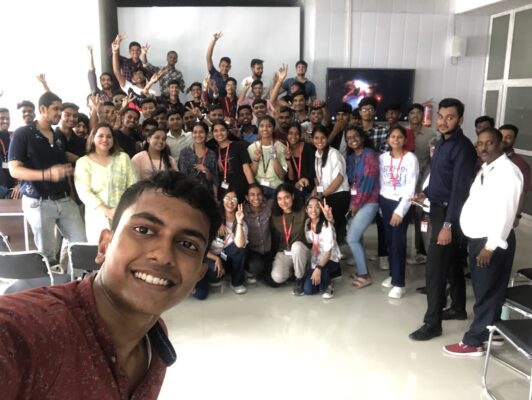
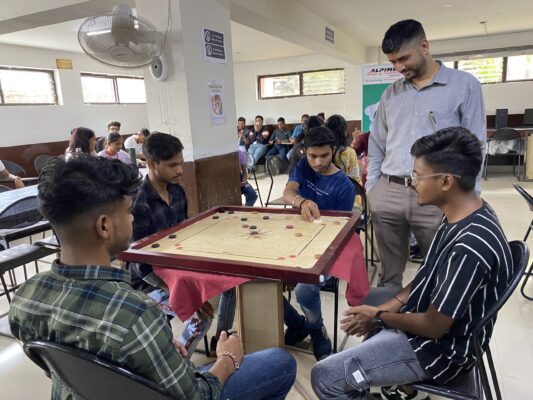

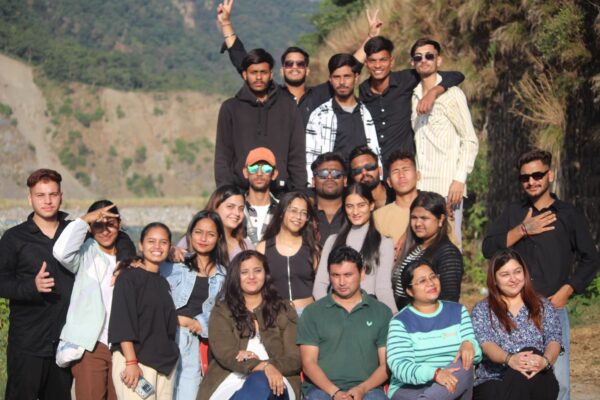
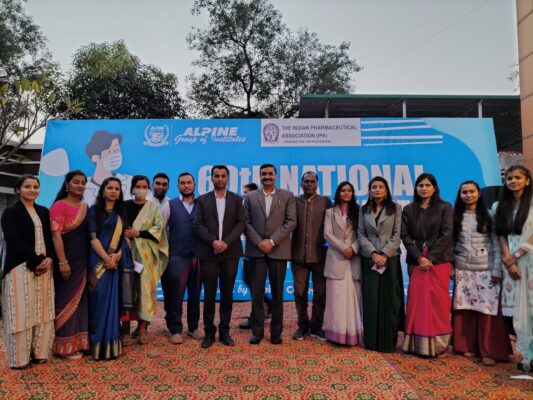
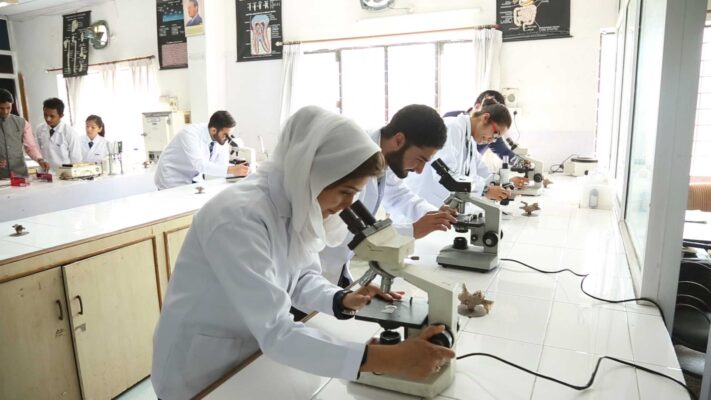
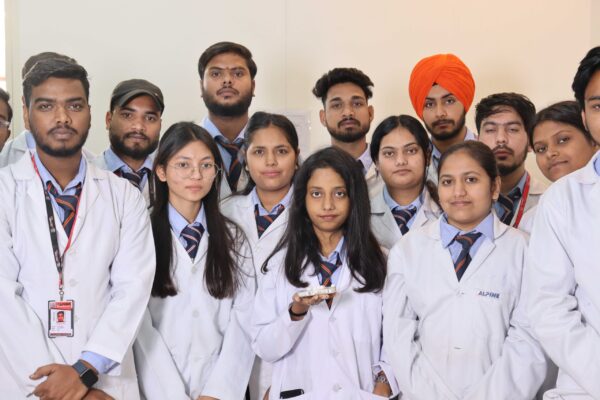
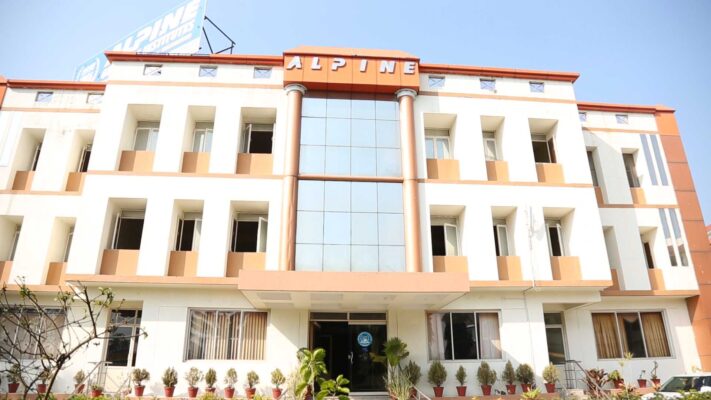

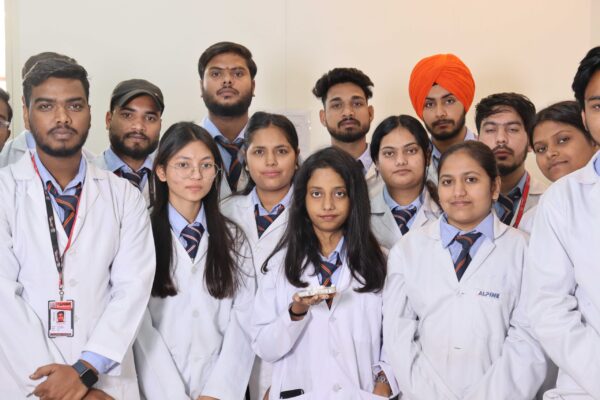
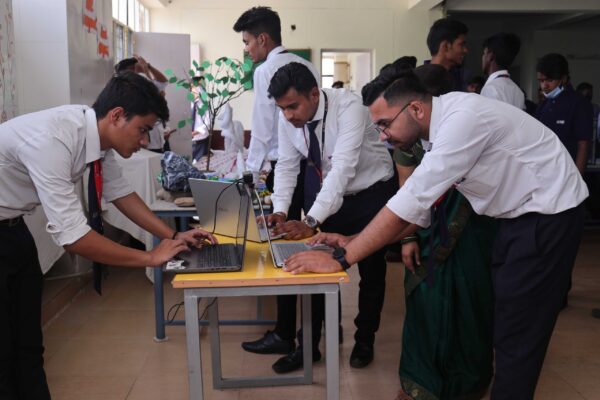
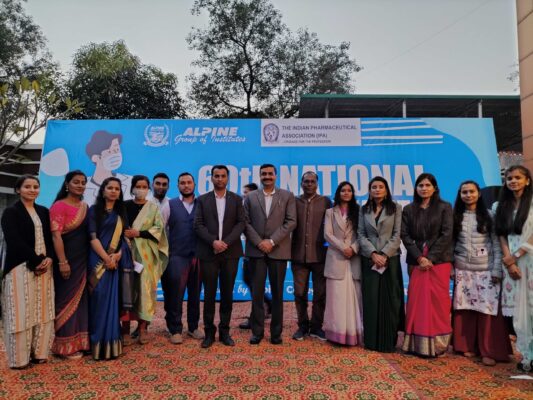
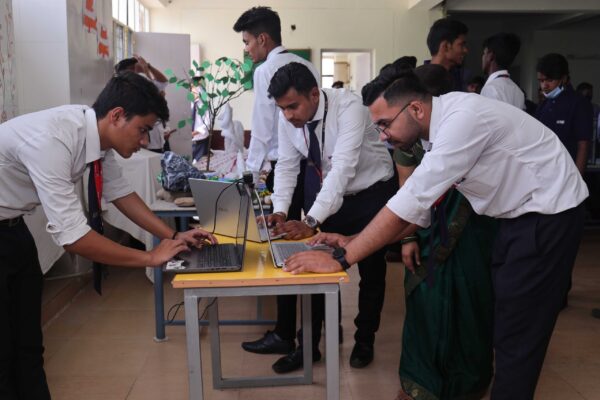
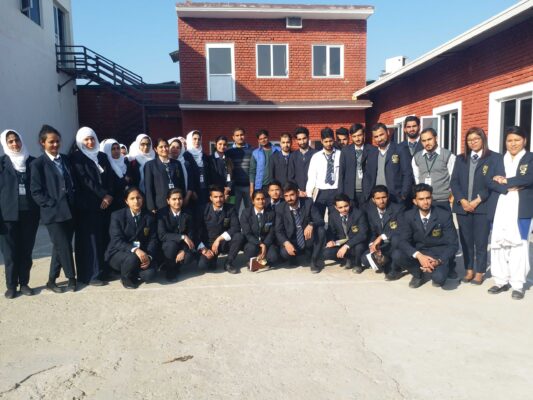
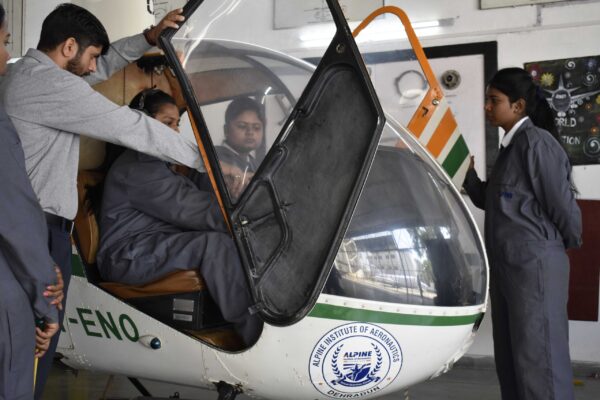
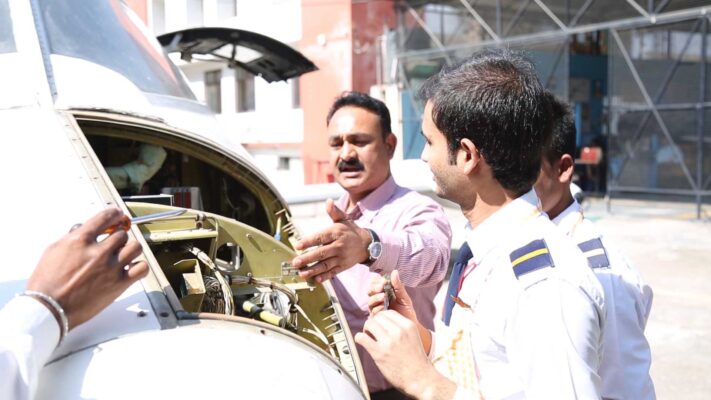
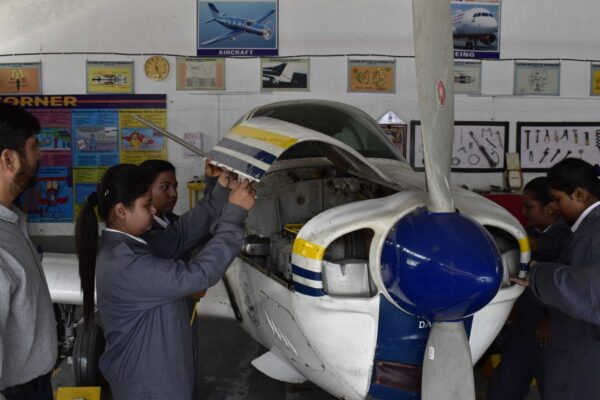

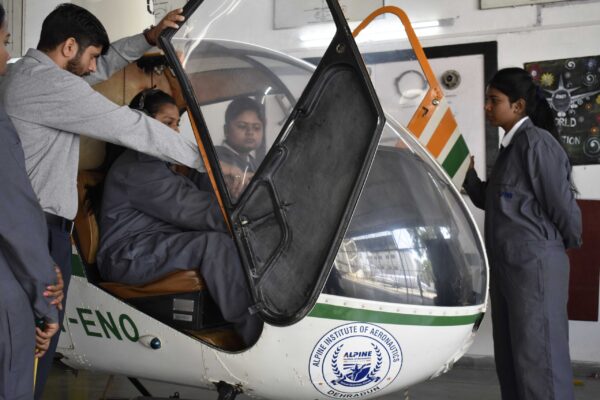
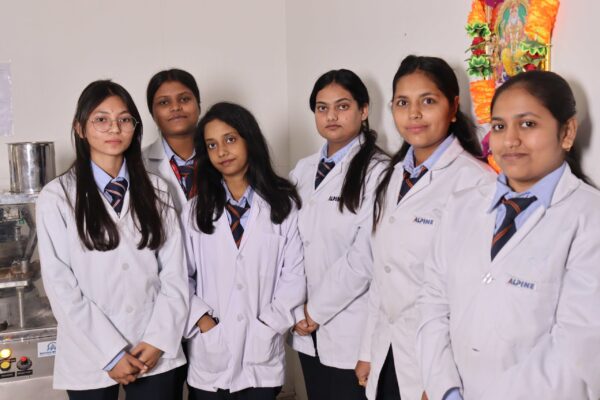
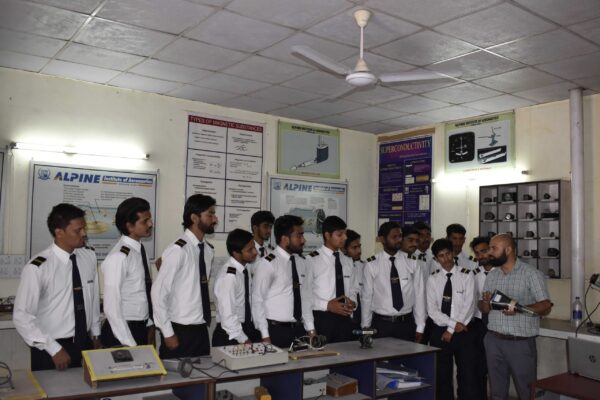
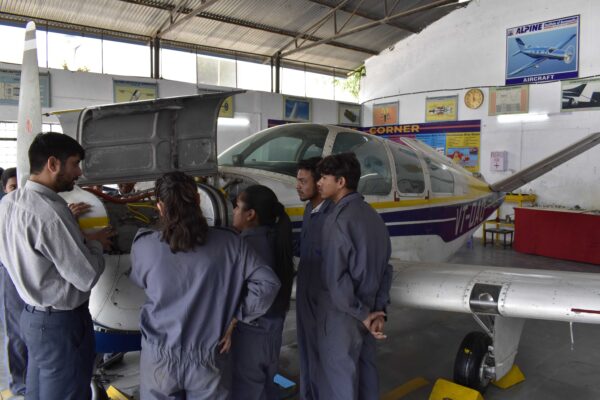
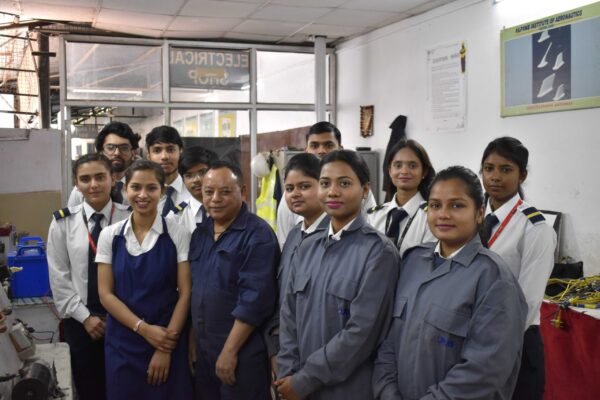
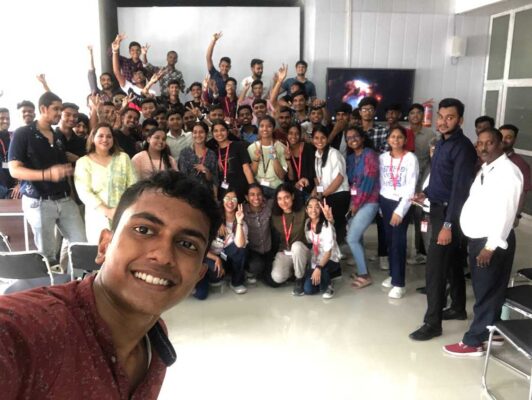
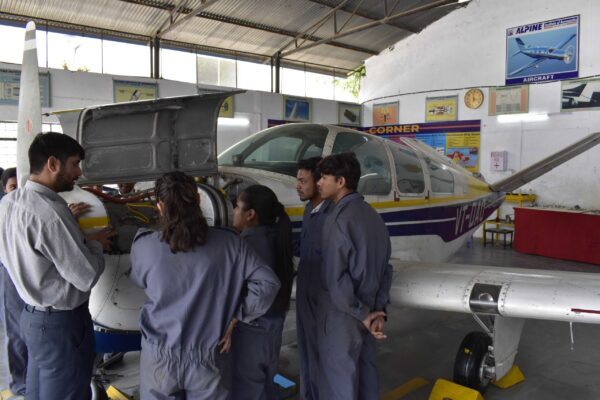
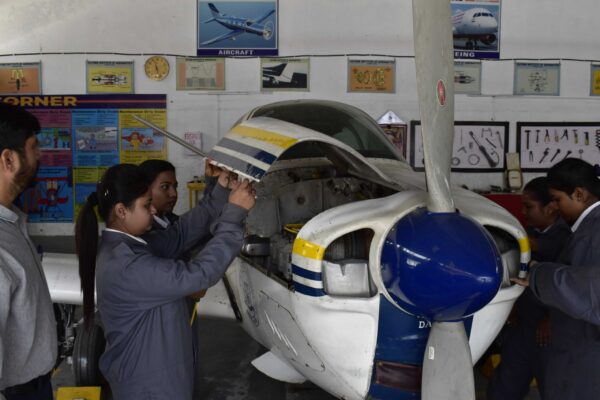
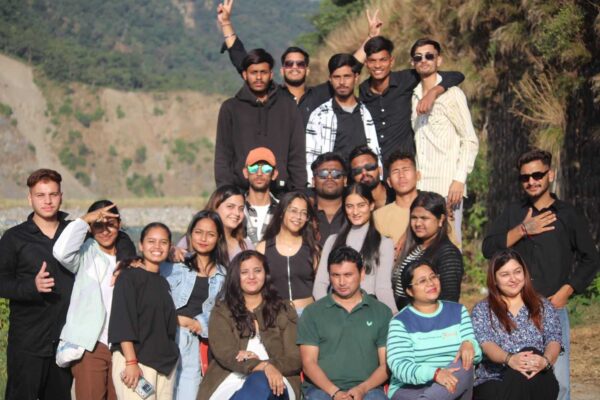


Frequently Asked Questions
Question 1: What is the scope of a B.Tech in Computer Science Engineering?
CSE is one of the most sought-after engineering branches with a broad scope in various domains like software development, data science, cybersecurity, artificial intelligence, and cloud computing. Graduates can pursue careers in IT companies, startups, R&D, or even in academia. The demand for skilled CSE professionals is high, especially in the tech-driven world.
Question 2: What are the key subjects taught in CSE?
Core subjects include:
- Programming Languages (C, C++, Python, Java)
- Data Structures and Algorithms
- Operating Systems
- Database Management Systems
- Computer Networks
- Artificial Intelligence & Machine Learning
- Web Development
- Cloud Computing
Electives may include subjects like blockchain, IoT, and cybersecurity.
Question 3: What are the career opportunities after completing B.Tech in CSE?
Top career paths include:
- Software Developer/Engineer
- Data Scientist/Analyst
- AI/ML Specialist
- Full Stack Developer
- Cybersecurity Analyst
- Game Developer
- Cloud Architect
Leading recruiters include companies like Google, Microsoft, Amazon, Infosys, TCS, and startups in the tech space.
Question 4: Is coding necessary for pursuing CSE?
Yes, coding is a fundamental skill for CSE students. However, students are not expected to be experts before starting. Programming skills are taught during the course, starting with beginner-friendly languages. Enthusiasm for problem-solving and logical thinking is more critical than prior expertise.
Question 5: What are the higher education opportunities after B.Tech in CSE?
- M.Tech/M.S.: Specialize in advanced areas like AI, data science, or networking.
- MBA: Transition into tech management roles.
- Ph.D.: For research-intensive careers in academia or R&D.
- Certifications: Industry-recognized certifications like AWS, Cisco (CCNA), or Microsoft Azure to boost career prospects.




